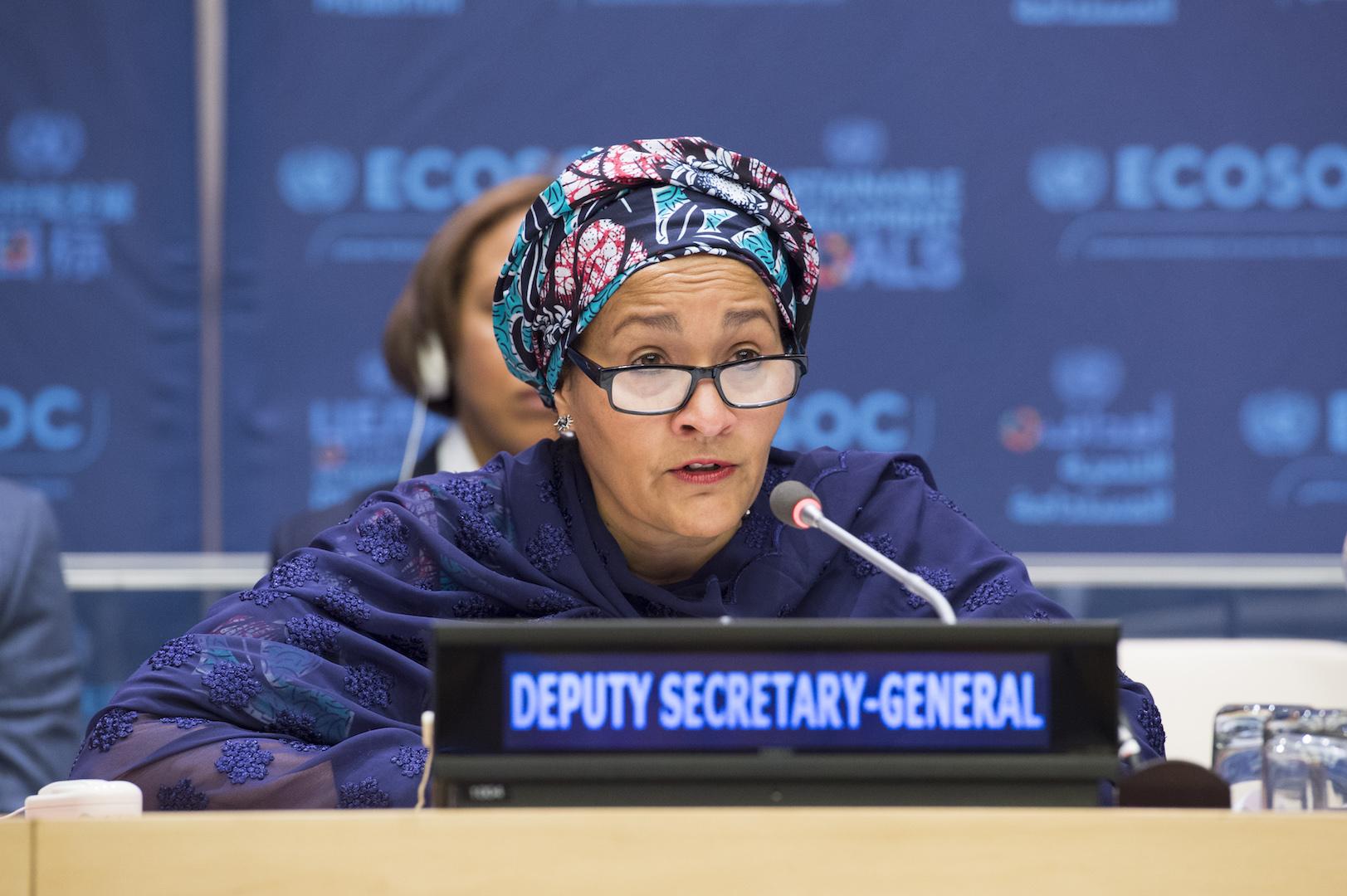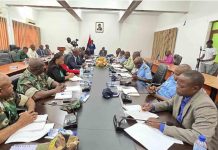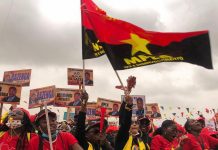Africa-Press – Angola. The Deputy Secretary General of the UN, Amina Mohammed, considers that African countries have all the prerequisites for the path of sustainable development and that their integration into the world economy will overcome many of the current obstacles.The diplomat, who was in Tunisia last week for the 8th Tokyo International Conference on African Development, stressed that the international community must change its perception of Africa from a dependent continent to a key region on the global stage, with the same rights and position of other continents.
More than 1.2 billion people live in Africa. Approximately 60 percent of the African population is under the age of 35. Rapid urbanization in African countries promises new opportunities, including in the field of industrialization on the continent. Amina Mohammed believes the continent can benefit from the Sustainable Development Goals and the 2063 Agenda for Africa to continue moving forward.
The UN representative stressed that, in order to achieve these goals, the international community must jointly reduce the consequences of the numerous crises. The diplomat recalls that the recovery from the Covid-19 pandemic, the consequences of the war in Ukraine, the climate emergency and the financial crisis are placing already vulnerable populations in even greater challenges.
Amina Mohammed added that the set of crises can create fertile ground to exacerbate existing conflicts and generate unrest, which undermines collective efforts to achieve the SDGs. The UN Deputy Chief also spoke about the African Free Trade Area, which contributes to the industrialization, diversification and digitization of the economies of the countries in the region, as well as helping to strengthen regional cooperation.
Fronts of action
Amina Mohammed called on the international community to work on three fronts that would benefit African economies and help achieve the Sustainable Development Goals.
First, it asserts that universal access to energy and a just and equitable transition to renewable energy are needed. In this context, the UN Deputy Chief called for an integrated approach to guide Africa’s energy development paths, based on sustainable investments and strong partnerships. Today, around 600 million people in Africa face electricity shortages. This means that the continent will need mechanisms for the development of clean energy sources.
The current rise in energy prices could also encourage African countries to make the most of the continent’s vast renewable energy potential. But this requires timely investments on a large scale. Second, Africa urgently needs to transform food systems. In the opinion of Amina Mohammed, Africa needs to increase productivity in agriculture and food systems, use new technologies and modern irrigation systems, achieve agricultural mechanization and reduce post-harvest losses.
The diplomat concluded that Africa’s problems caused by interconnected crises will not be solved without addressing inequalities. United Nations The President of Tunisia, Kais Saied, met with the Deputy Secretary-General and mentioned a new era in the world with Covid-19 and the war in Ukraine, but also in Tunisia with a new Constitution that will establish better responsibility for all and the society of rights for its population. The Tunisian leader acknowledged that the UN plays an important role as “united nations”, “working together” to face the challenges. It is the main aspiration of the UN Charter. Amina Mohammed recalled the UN Secretary General’s invitation to the Tunisian President to participate in the next General Assembly and in the important meeting on Transformative Education. As a teacher, President Saied could help redefine and rethink education in Africa.
The President confirmed his interest in participating and mentioned that it is essential to adapt education to the new era and that a supreme council for education and learning is foreseen in the new Constitution of Tunisia.
Accelerate Industrialization
The president of the UN Economic and Social Council (ECOSOC), Collen Vixen Kelapile, believes that accelerating industrialization and diversification are key to changing the course of Africa. And, for the first time in a generation, the region has taken decisive action and has the leadership to be the authors of its destiny. In recent statements, Collen Kelapile also cited Agenda 2063, which he examines as “pragmatic and achievable”, with concrete 10-year implementation plans. With the completion of the first phase of the agenda next year, the diplomat believes that this is “the right time to have a prospective dialogue”. Collen Kelapile also commended the active participation of a record number of African countries in the Voluntary National Reviews of the Sustainable Development Goals.
For the diplomat, this is a clear demonstration that the continent is committed to the full realization of both Agenda 2030 and Agenda 2063, “which are mutually reinforcing and complementary”. Internal Resources and Regional Integration On financing for development, in mobilizing domestic resources in particular, Collen Kelapile states that Africa’s investment needs to achieve the SDGs were estimated at US$200 billion a year before the crises.
With the pandemic and the financing deficit, it increased by another 145 billion dollars, according to the International Monetary Fund, IMF Index. As for regional integration: the African Continental Free Trade Area foresees a market of 1.3 billion people, with a combined GDP of USD 3.4 billion, which can make Africa a true global partner. According to the president of Ecosoc, the most recent estimates from the World Bank and the Secretariat of the Free Trade Area are that, when fully implemented, the bloc could increase the continent’s real income by 9 percent by 2035 and withdraw another 50 million people from extreme poverty.
Climate Change
Collen Kelapile points out that while Africa is home to 17 percent of the world’s population, it emits only about 3.8 percent of global carbon emissions. Still, the continent is extremely vulnerable to the impacts of global warming in the form of more extreme weather, which leads to more pressures on access to resources and results in a vicious cycle of conflict and unrest with negative repercussions for the rest of the world.
Financial flows
However, the Green Climate Fund (GCF) estimates that Africa receives only 5 percent of total financial flows for climate investments. Collen Kelapile recalled that, at COP26, African negotiators proposed a target of USD 1.3 billion in financial flows from 2025 to deal with the challenges of climate change.
The diplomat ended with the issue of strengthening the power of future generations and women, noting that no one can be left behind to achieve the goals of the 2030 Agenda. For the president of Ecosoc, investments in human capital and training are essential to ensure that “every African citizen has the opportunity to earn a fair income, live a healthy life and contribute to society”.
Own Narrative
Amina Mohammed stated that the United Nations shares the vision outlined in the African Union’s Agenda 2063, of a continent shaped by its own narrative, informed by its own citizens and representing a dynamic force on the global stage.
NEGRITUDE
African Literature in Portuguese Language
Portuguese-speaking African literature was born out of a historical situation that originated in the 15th century, a time when the Portuguese (chroniclers, poets, historians, travel writers, men of science and the great European literature) began the route to Africa, then continued through Asia, Oceania and America.
Gomes Eanes de Zurara, João de Barros, Diogo de Couto, Camões, Fernão Mendes Pinto, Damião de Góis, Garcia de Orta, Duarte Pacheco Pereira are some names whose discourse is fueled by the “knowledge of experience made” achieved from the 15th century onwards. , already in decline in the 17th century) and exhausted in the 18th century. The work of Gil Vicente (16th century) or, although scarcely, that of poets from the songbooks (14th and 15th centuries) alongside the “things to play”, were marked by the expansion throughout the «barbarian kingdoms». It is a literature made by the Portuguese, the result of the adventure overseas, in the Renaissance period, which was called the literature of discoveries.
This literature, born of a planetary experience, has nothing to do with Portuguese-speaking African literature. This record only serves to contextualize in the past facts related to the cultural and political framework that would emerge a century later.
Indeed, from the 15th century onwards, the process of colonization in Africa began, which, centuries later, determined the emergence of a new literature, colonial literature (1900-1939).
How does colonial literature differ from the literature of discoveries?
While the literature of the discoveries was based on travel reports made by navigators, writers, traders, etc., and narrated facts that occurred during these voyages, colonial literature portrays the experience of the Portuguese overseas. In this literature, the center of the narrative and poetic universe is the European man and not the African man. It was a profoundly racist literature, where the ideas of inferiority of the black man predominated, which racist theorists, such as Gobineau, had spilled, and to which the philosopher Lévy Bruhl would have contributed with his pre-logical mentality thesis. It is also important to say that, in this literature, Africa was seen only as a beautiful landscape, or a paradise, and the protagonist of this landscape was the European man. It is, therefore,
It must be said that these racist discourses were the result of the mentality of the time, from the political and social point of view. However, there were some writers such as João de Lemos (Almas Negras) and José Osório de Oliveira (“Roteiro de África”) who tried to understand the mentality of the black man, as there is a humanistic intention in their works.
These are precisely the harsh and reprehensible characteristics of colonial literature, and other factors such as the creation and development of official education and the expansion of private education, freedom of expression, the installation of the press (from the 1940s onwards) that will propel the emergence of a new literature that is conventionally called African literature of Portuguese expression.
Indeed, a few years later, after the installation of the press in Angola, the book “Espontaneidade da minha alma” (1949) by the mixed-race Angolan José da Silva Maia Ferreira was published, the first book printed in Portuguese-speaking Africa, but not the oldest work by the African author. Previous to this, there is knowledge of the poem by Cape Verdean Antónia Gertrudes Pusish, “Elegy to the memory of the unfortunate victims murdered by Francisco de Mattos Lobo, on the night of 25 June 1844”, published in Lisbon In the same year.
African literature, as a set of literary works that translate a certain Africanness, takes this designation because Africa is the reason for its message to the world, because the technical processes of its writing stand against European and Europeanizing fashion. John called it Neo-African literature because it was written in European languages and to differentiate it from oral literature produced in African languages. In this literature, the center of the universe is no longer the European man and becomes the African man.
It is necessary to emphasize that this type of literature, called African literature of Portuguese expression, gains a new specialization, taking the designation of literature of African roots. This literature had its origin through confrontation, literary, linguistic and ideological rebellion, and revolutionary awareness from the 1940s onwards (19th century). It is important to mention that it was a literature aimed particularly at Africans and written in local languages mixed with “Portuguese”, as the purpose was to make writing inaccessible to Europeans, that is, not to allow the white man to decode their messages. Hence the introduction in the works of Angolan poets (Agostinho Neto, António Jacinto, Pinto de Andrade, Luandino Vieira, etc.)
This phase goes from the mid-1940s to independence (mid-1970s). “The true life of Domingo Chavier” by Luandino Vieira and “Sagrada esperanza” by Agostinho Neto are texts impregnated with visible marks of political revolt that are most translated in the four corners of the world.
African literature combats exoticism in all its forms, whether it presents itself by recovering traditional narratives or uses significant rhythms borrowed from popular cultures.
For More News And Analysis About Angola Follow Africa-Press






